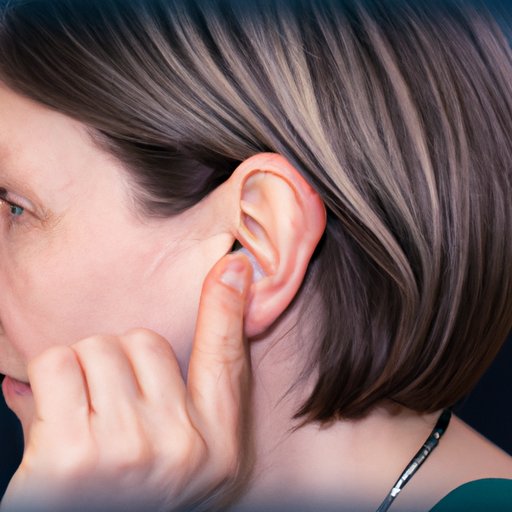
Introduction
Tinnitus is a condition that affects millions of people, where one experiences sounds in their ears or head like ringing, buzzing, roaring, or hissing without an external source. Tinnitus can be occasional or constant, and the sound can be soft or loud. It can cause anxiety, difficulty sleeping, and stress. Tinnitus can be a symptom of an underlying health condition or a result of exposure to loud noises, excessive earwax, or aging. In this article, we will explore the causes and various ways to help stop ringing in ears.
Identify the Causes of Tinnitus
The most common causes of tinnitus include prolonged exposure to loud noises, ear infections, aging, high blood pressure, and some medications. Exposure to loud music, construction sites, or machinery can cause damage to the hair cells of the inner ear, leading to the ringing sensation. Some medications like diuretics, aspirin, and antibiotics can cause tinnitus. Identifying these triggers and avoiding them can help prevent tinnitus.
Lifestyle Changes
One of the effective ways to prevent and manage tinnitus is through lifestyle changes. Reducing your intake of caffeine, alcohol, and tobacco can help mitigate the effects of tinnitus. Additionally, stress and inadequate sleep can worsen the condition. Hence, relaxation techniques like yoga, deep breathing, or sound therapy can do wonders. Adequate sleep and exercise can also help individuals deal better with tinnitus.
Natural Remedies
Natural remedies are an excellent way to manage tinnitus. Some of the remedies include herbal supplements like ginkgo biloba, magnesium, and zinc supplements, or acupuncture. Ginkgo biloba, a herbal supplement known for its anti-inflammatory properties and antioxidant ability, helps increase blood flow in the inner ear. Zinc supplements improve hearing loss caused by tinnitus. Acupuncture, an ancient Chinese practice, stimulates the body’s healing process and reduces the ringing sensation.
Medical Treatment
If lifestyle changes and natural remedies fail to improve the condition, consult a doctor or an audiologist for further evaluation. Tinnitus treatment depends on the underlying cause. For instance, if the condition is due to high blood pressure, an adjustment of medication can be made. If caused by anxiety, cognitive behavioral therapy can be combined with medication to manage the tinnitus. Hearing aids can help in cases of the loss of hearing that caused tinnitus.
Coping Mechanisms
Coping mechanisms can also help manage tinnitus. Relaxation techniques such as deep breathing, guided meditation, or listening to music can redirect attention from the ringing to peaceful sounds. Individuals can also seek support groups and counseling services to get help. Distraction techniques like engaging in hobbies or taking up new activities can keep the mind focused, leading to reduced anxiety and stress.
Conclusion
If you experience constant ringing in your ears, take action to manage your tinnitus. Lifestyle changes, natural remedies, medical treatment, and coping mechanisms can help reduce the impact of tinnitus. Get enough sleep, reduce alcohol, caffeine, and tobacco use, eat healthily, and exercise. Remember, tinnitus is highly manageable, and you can make a difference in your life by adopting a healthy lifestyle and seeking help when needed.





